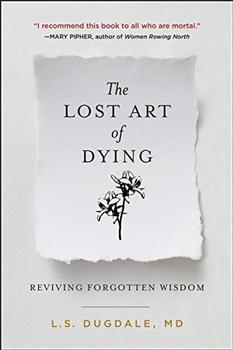
Reviving Forgotten Wisdom
by L.S. Dugdale
A Columbia University physician inspires us to rethink death and offers insights on how we can learn to embrace the art of dying well in this wise, clear-eyed book that is as compelling and soulful as Being Mortal, When Breath Becomes Air, and Smoke Gets in Your Eyes.
As a specialist in both medical ethics and the treatment of older patients, Dr. Lydia Dugdale knows a great deal about the end of life. Far too many of us die poorly, she argues. Our culture has overly medicalized death: dying is often institutional and sterile, prolonged by unnecessary resuscitations and other intrusive interventions. We are not going gently into that good night—our reliance on modern medicine can actually prolong suffering and strip us of our dignity. Yet our lives do not have to end this way.
Centuries ago, in the wake of the Black Plague, a text was published offering advice to help the living prepare for a good death. Written during the late Middle Ages, Ars moriendi—The Art of Dying—made clear that to die well, one first had to live well. When Dugdale discovered this Medieval book, it was a revelation. Inspired by its holistic approach to the final stage we must all one day face, she draws from this forgotten work, combining its wisdom with the knowledge she has gleaned from her long medical career. The Lost Art of Dying is filled with much-needed insight and thoughtful guidance that will change our perceptions. Dr. Dugdale offers a hopeful perspective on death and dying as she shows us how to adapt the wisdom from the past to our lives today.
Part of living well means preparing for the end, Dr. Dugdale reminds us. By recovering our sense of finitude, confronting our fears, accepting how our bodies age, developing meaningful rituals, and involving our communities in end-of-life care, we can discover what it means to both live and die well.
The Lost Art of Dying Well is a vital, affecting book that reconsiders death, death culture, and how we can transform how we live each day, including our last.
Includes 9 black-and-white drawings from artist Michael W. Dugger.
"Dugdale discusses the wide variety of responses people have to near-death experiences...and urges readers to think twice about hospitalization and resuscitation, especially for the frail. This illuminating and thought-provoking book will convince many readers to reexamine their assumptions about death and dying." - Publishers Weekly (starred review)
"Dugdale balances her clinical experience with an openly holistic mindfulness...A wise and reassuring guide for confronting death." - Kirkus Reviews
"A readable and inspiring manual for living one's days fully and dying well." - Library Journal
"Kudos to Dugdale's The Lost Art of Dying for being honest, refreshing, and useful. As a physician who has experienced many deaths, she helps us think about the meaning of our lives and about how to have a good death. I recommend this book to all who are mortal." - Mary Pipher, author of Women Rowing North
"In this profound and compassionate book about death and its nearness, Dugdale demystifies one of the essential mysteries of our time." - Siddhartha Mukherjee, the Pulitzer Prize-winning author of The Emperor of All Maladies and The Gene
"Want a better life? Then think about your death, starting with Lydia Dugdale's The Lost Art of Dying. Dugdale shows that death should be courageously confronted. In so doing, we not only conquer our fear, but also understand the reason for our lives." - Arthur C. Brooks, author of Love Your Enemies and professor at the Harvard Kennedy School
"Dugdale examines how we have surrendered to the medical machine while surfacing ways we can regain control of key decisions over our quality of life and death. Everyone must read this book, whether you are a health-care professional, a public-policy official, or just hoping to reach an advanced age." - Jeffrey Sonnenfeld, Senior Associate Dean, Yale School of Management
"In this important new book, Dugdale asks why it is so difficult for patients and families to accept terminal diagnoses and for all of us to recognize our finitude. The solution, Dugdale proposes, is for us to learn about dying now, as part of our living. And she is right." - Victoria Sweet, MD, PhD, author of God's Hotel and Slow Medicine
This information about The Lost Art of Dying was first featured
in "The BookBrowse Review" - BookBrowse's membership magazine, and in our weekly "Publishing This Week" newsletter. Publication information is for the USA, and (unless stated otherwise) represents the first print edition. The reviews are necessarily limited to those that were available to us ahead of publication. If you are the publisher or author and feel that they do not properly reflect the range of media opinion now available, send us a message with the mainstream reviews that you would like to see added.
Any "Author Information" displayed below reflects the author's biography at the time this particular book was published.
Lydia Dugdale MD, MAR, is associate professor of medicine and director of the Center for Clinical Medical Ethics at Columbia University. Prior to her 2019 move to Columbia, she was Associate Director of the Program for Biomedical Ethics and founding Co-Director of the Program for Medicine, Spirituality, and Religion at Yale School of Medicine. She is an internal medicine primary care doctor and medical ethicist. Her first book, Dying in the Twenty-First Century (MIT Press, 2015), provides the theoretical grounding for her second book, The Lost Art of Dying. She lives with her husband and daughters in New York City.




Beware the man of one book
Click Here to find out who said this, as well as discovering other famous literary quotes!
Your guide toexceptional books
BookBrowse seeks out and recommends the best in contemporary fiction and nonfiction—books that not only engage and entertain but also deepen our understanding of ourselves and the world around us.